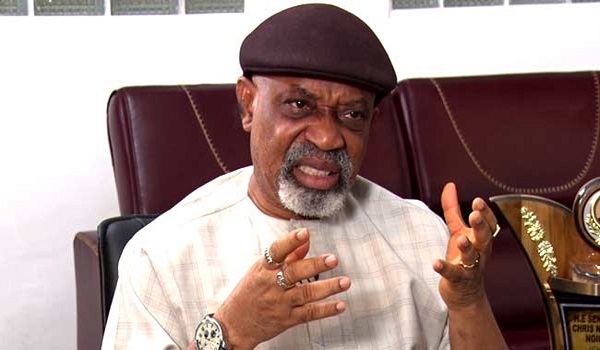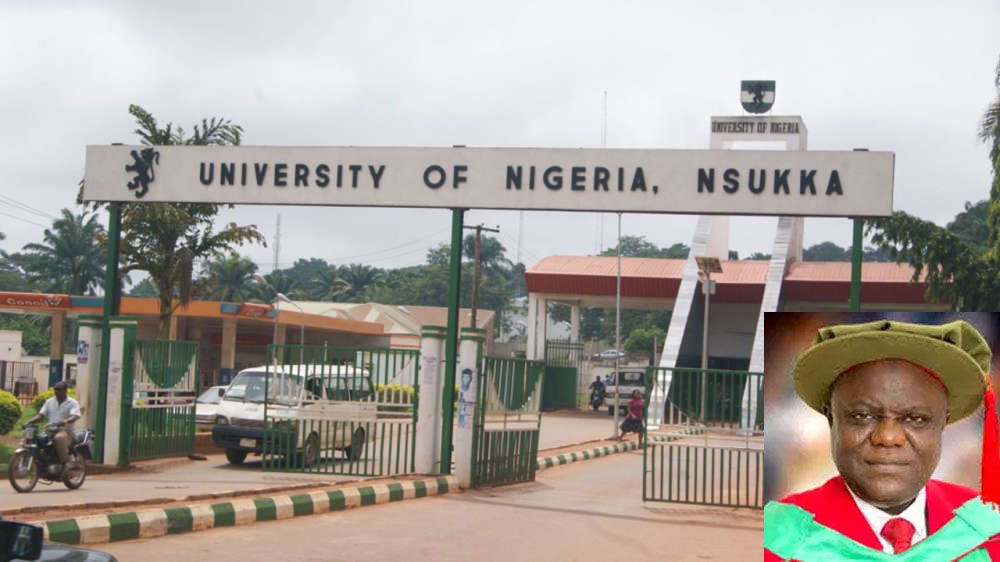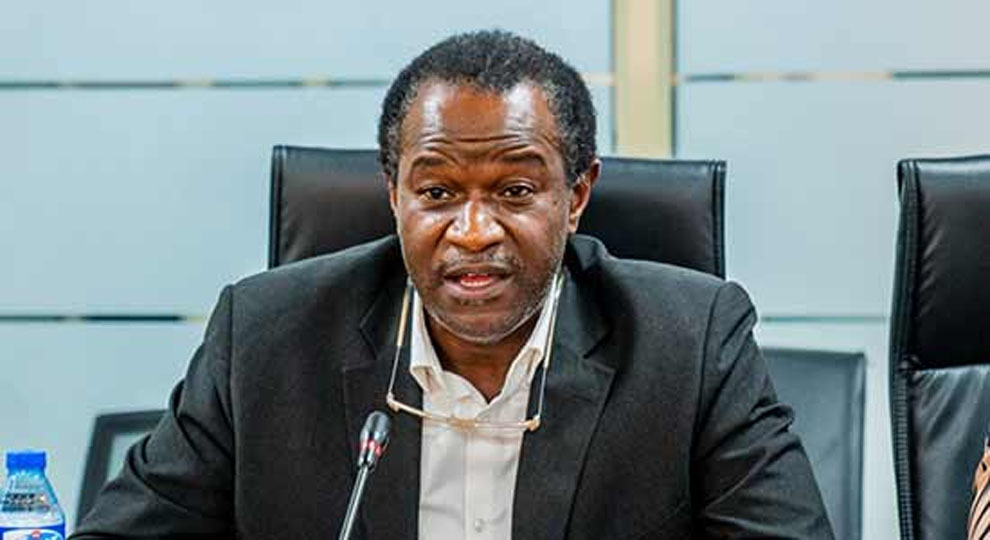“I will be firm, fair, and transparent in the discharge of my duties. UNN must not lag behind in the current technological revolution, characterised by the rivalry between OpenAI and DeepSeek,” he assured.

The Federal Government says it is not against negotiating a new welfare package for university workers including lecturers in line with current realities.
It said this as the Nigeria Labour Congress is set to meet with leaders of the university over the face-off between the four university-based unions and the FG concerning the non-payment of minimum wage arrears, the shortfall in salary payment, renegotiation of the 2009 agreement and revitalization funds, among others.
Speaking at a meeting with members of the 2009 FG and university-based unions renegotiation committee, the Minister of Labour and Employment, Senator Chris Ngige, said that the government was not happy with the approach being used by the Academic Staff Union of Universities to pursue its demands.
ASUU embarked on a one-month warning strike on February 14 and extended it by another two months at the expiration of the warning strike over the alleged failure of the government to address their demands.
Ngige, at the meeting with the Federal Government Renegotiation Committee in his office, pleaded with the committee to ensure that it concludes its assignment within six weeks as provided in the Memorandum of Action with the unions.
He asked the renegotiation team to keep to the six-week timeline for the conclusion of their assignment.
He said the Federal Government was aware of the level of depreciation to which the Lecturers earning have been subjected due to the rise in the inflationary rate, adding that he had advised the leadership of ASUU to find a better way of pressurizing the Federal Ministry of Education and National Universities Commission to hasten action on the Implementation of agreements reached with the government rather than rushing to strike every time there was a disagreement.
He said, “I am not Minister of Education. I cannot go to the Education minister and dictate to him how to run his place. But I told ASUU that you should be bombarding them at the Federal Ministry of Education for this to be moved forward.
“There are many ways to do so. If you go to the labour act, there is something called picketing. You can picket. The strike is an ultimate thing. Picketing means that you can stay in the corridor, clapping or singing. Workers are permitted to do so.
“But I am tired of every time there is a disagreement, it is a strike. And the bosses in the Federal Ministry of Education don’t feel the strike. It is the children and some of us parents that have our children in public schools.”
The minister also said that he had commissioned studies on productivity vis-a-vis emoluments and that the result was that payments done 10 years ago when the dollar was strong have now lost value with 100 per cent depreciation.
He said, “Why won’t I support if ASUU and their unions now want a renegotiation of their conditions of service, which is the main thing in the proposal by the previous committee?”
Chairman of the 2009 FG and University-based union renegotiation Committee, Prof. Nimi Briggs, said his committee was consulting all the stakeholders with a view to finding an amicable solution to the ASUU dispute.
Meanwhile, the leadership of the NLC has scheduled to meet with the four university-based unions over the ongoing strike in the universities.
NLC said it was worried that public universities in the country have been closed down as a result of the strike embarked by the Academic Staff Union of Universities, ASUU, Senior Staff Association of Nigerian Universities, SSANU, Non-Academic Staff Union of Allied Educational Institutions, and the National Association of Academic Technologists.
The four unions affiliated with the NLC shut down universities over unresolved issues including difficulties they face with the Integrated Payroll and Personnel Information System, non-payment of the minimum wage arrears, revatizatipn funds, and nonreview of the 2009 Agreement with the government.
After ASUU commenced strike in February, .SSANU and NASU through its Joint Action Committee, JAC, in March, also embarked on a two-week warning strike following the alleged government failure to address the concerns they raised which includes the nonpayment of minimum wage arrears after many promises made to them by the government.
NAAT also declared its warning strike in early March to press home its demands.
The NLC explained that the scheduled meeting with the four striking unions was to know their level of engagement with the federal government.
Vanguard reported General Secretary of NLC, Emma Ugbaja, as saying on Monday that the meeting slated for 10am on Tuesday at the Labour House was aimed at seeing a way to resolve the face-off between the aggrieved unions and government in the interest of all stakeholders.
Ugbaja said that it was proper to hear from the unions first before taking any position, adding that the interest of labour was to ensure that the matter was sorted out.

UNN appoints Prof Olayiwola Usman as first Yoruba DVC (Academics)
The University of Nigeria, Nsukka (UNN) has appointed Professor Kamoru Olayiwola Usman, a Yoruba Muslim from Oyo State, as Deputy Vice-Chancellor (Academics), marking the first time in the institution’s history that a person of Yoruba descent has held the position.
The appointment, made by the Acting Vice-Chancellor (Ag. VC), Professor Oguejiofo T. Ujam, is part of ongoing reforms aimed at fostering inclusive governance and restoring the university’s academic excellence.
In a statement issued yesterday in Abuja, the university reaffirmed its commitment to merit-based leadership and national unity.
Professor Ujam stated: “The appointment of Professor Usman reflects our resolve to prioritise competence over sectional considerations. It is imperative that we sustain this culture of inclusivity and meritocracy to move the university forward.”
In addition to Professor Usman’s appointment, the Acting VC also named Dr Mansur Adebowale Saddiq as Acting Director of the Medical Centre, further demonstrating his commitment to promoting excellence over sectional interests.
Both appointments have been widely welcomed by scholars and students from diverse backgrounds, recognising them as steps towards strengthening national unity within the institution.
READ ALSO:
Professor Usman, who succeeds Professor Urama, holds a PhD in Mathematics Education and previously served as Provost of the Federal College of Education (Special), Oyo State, from 2015 to 2023.
A distinguished academic, he is a fellow of the Mathematical Association of Nigeria and a member of several professional bodies, including the National Institute of Policy and Strategic Studies and the Nigerian Educational Research Association. His initial tenure as DVC (Academics) will last for two years, with the possibility of renewal.
Meanwhile, the statement also highlighted that during a recent University Senate meeting, Professor Ujam emphasised the collective responsibility of repositioning UNN as a centre for ethical and innovative learning.
“A collective effort is required to place the institution on a steady path towards ethical and innovative learning. UNN must regain its pride of place as Nigeria’s premier university. We must rid the system of narrow-minded sectionalism and divisive tendencies that have eroded the enabling environment for research, comparative studies, and the adaptive application of new knowledge,” the statement read.

FG to pay corps members backlog of delayed N77,000 allowance
The Federal Government has promised to pay the backlog of the new ₦77,000 monthly allowance to members of the National Youth Service Corps (NYSC).
The corps members’ allowance was increased from ₦33,000 to ₦77, 000 in September 2024.
However, the new rate has yet to be implemented.
Minister of Youth Development, Ayodele Olawande, on Monday said serving corps members and those in the scheme when the increment was announced in September 2024 would receive a backdated payment.
He gave the assurance when he was featured on Channels Television’s Politics Today.
He said, “You saw the new DG saying that you will get it, and they’re asking him a question ‘What about those that are going out now, are they going to receive it [backlog]?’ He said ‘We have your details’,” the minister said.
“The backlog, we will work on it and make sure it is paid. It may not be immediate but it will happen.”

Why postgraduate students are ineligible for FG loan – NELFUND
The Nigerian Education Loan Fund (NELFUND) has clarified the eligibility criteria for the scheme, explaining why students pursuing post-graduate programmes are not qualified to apply for the facility.
Managing Director of the Fund, Akintunde Sawyerr, gave the revelation while speaking on TVC’s Breakfast Saturday.
Sawyerr also addressed concerns regarding postgraduate students’ eligibility for the loan, explaining that the facility is currently only available to students pursuing their first degree.
“The way the President has set this up and the way he has insisted that this must work is that you don’t need to know anybody to access this loan. And that’s what we are doing. No connections, no long leg, no man-know-man. We are not going to allow it to happen. The President wants us to completely democratize education.”
Although repayments have not yet been received, the Managing Director assured that the Fund is developing a robust repayment structure to facilitate timely and effective loan repayments.
He said currently, postgraduate students are not eligible to apply for the loan, as the primary focus is on supporting students pursuing their first degree.
Sawyerr, however, offered a glimmer of hope for postgraduate students, indicating that they may be eligible for the loan facility in the future.
“Post-graduate students can’t apply for this loan. We have a lot of people in this country who are just trying to get on the first rung of the ladder as far as tertiary education is concerned. The funds we have are focused on those people who are looking for their first opportunity.
READ ALSO:
“I congratulate those who have graduated who are doing their Master’s or PhDs, it’s fantastic. At some point in the future, we will be able to fund them. Today, we are looking for those who need us most. They are the people we want to support.”
He emphasized that while plans exist to extend financial support to postgraduate students, the immediate priority remains assisting undergraduates who face financial difficulties.
The Fund is committed to ensuring that students do not drop out of tertiary institutions due to lack of funds, and future adjustments to the loan scheme will be considered based on available resources and policy direction.
According to the Managing Director, revealed that more than 271,000 Nigerian students pursuing tertiary education have received a financial lifeline through the Federal Government’s Student Loan program since its launch in May 2024.
“Nigerian students are reacting extremely positively to the initiative. And as more disbursements happen, they are becoming more trusting. One of the interesting things going on at the moment is that President Bola Tinubu is restoring trust in the government. The students are receiving it well. We are transparent about what we are doing.
“In total, to date, we have about 271,000 Nigerian students who have either had their fees paid or their fees plus upkeep,” he noted.
As of Saturday, March 22, out of 521,000 students who have registered for the loan facility, approximately 438,000 have submitted their applications.


Rivers administrator Ibas fires Fubara’s political appointees


JUST-IN: Ex-Oyo gov Ajimobi’s first child Bisola dies At 42


Canada removes bonus ranking points for job offers in Express Entry system


How ritualists, native doctor drugged, murdered underage sisters in PH – Police


Nigeria’s Super Eagles falter in W’Cup qualifiers against Zimbabwe, S’Africa lead, Egypt, Morocco qualify


FG declares public holidays for Eid-el-Fitr


Akpabio has habit of abusing women, says Atiku


Niger coup leader sworn in as president for five years